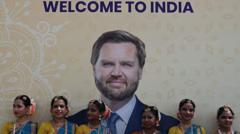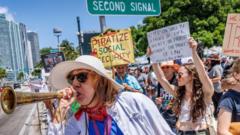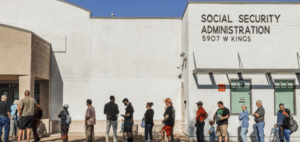**Despite protests and historical context, US officials remain firm on the importance of maritime security.**
**US Secretary of State Urges Panama to Limit Chinese Influence Over Canal**

**US Secretary of State Urges Panama to Limit Chinese Influence Over Canal**
**Marco Rubio issues stern warning as tensions rise between the US and Panama over canal control amidst Chinese investments.**
In a significant diplomatic move, US Secretary of State Marco Rubio has demanded that Panama take "immediate actions" to reduce what he perceives as China's encroaching influence over the Panama Canal. Rubio's visit to Panama City saw him convey to Panamanian President Jose Raul Mulino the necessity for stringent measures to safeguard American interests stemming from a treaty signed between the nations. The backdrop to this meeting echoes President Donald Trump's controversial pledge to reclaim control of the canal, an announcement that has triggered public dissent in Panama.
Emerging from their two-hour discussion, President Mulino portrayed a more conciliatory stance, advocating for technical conversations to ease US worries regarding Chinese presence rather than viewing military intervention as a threat. This perspective contrasts sharply with Rubio’s assertive approach, which has stoked fears at home. In recent days, Panama City has witnessed demonstrators burning effigies of Trump and Rubio, an indication of the public's disdain for what they perceive as an affront to their sovereignty.
Central to the unrest is a contentious narrative that suggests Chinese nationals are allegedly operating within the canal, a claim President Trump has made without substantial evidence. While both the canal’s management and ownership rest with Panama, Chinese companies have indeed expanded their footprint through investments in adjacent ports and infrastructure. The palpable reaction from Panamanians reflects a long-standing memory of US dominance over the canal, a legacy that many are unwilling to revisit.
Protests surfaced again on the streets of Panama City, where citizens voiced their discontent about the US's perspective on Chinese investments. They assert that such concerns should be viewed through the lens of Panama's progress in self-governance and autonomy. Resident Mari emphasized her resolve against regressive policies reminiscent of past US intervention, stating, "This is our sovereignty."
Furthermore, the notion of potential military intervention by the US has brought forth apprehensions among Panamanians, who recall the traumatic events of the 1989 US invasion intended to oust General Manuel Noriega. Edwin Cabrera, a former congressman, poignantly articulated the fear of re-experiencing imperialism in modern times. As tensions escalate, the dialogue surrounding the Panama Canal is becoming a microcosm of broader geopolitical dynamics involving the United States and China.
While Rubio's administration underscores the importance of limiting Chinese influence to secure maritime interests, many Panamanians express skepticism towards their own leadership regarding the equitable distribution of canal profits. Hotel worker Andre Howell voiced concern for the local populace not benefiting from the waterway's economic potential: "There is a felt disconnect; ordinary people aren't seeing the advantages."
As the situation develops, the discourse between the US and Panama reflects a nuanced interplay of historical context, national pride, and evolving international relations, pushing both nations to navigate through a challenging path towards mutual respect and understanding.
Emerging from their two-hour discussion, President Mulino portrayed a more conciliatory stance, advocating for technical conversations to ease US worries regarding Chinese presence rather than viewing military intervention as a threat. This perspective contrasts sharply with Rubio’s assertive approach, which has stoked fears at home. In recent days, Panama City has witnessed demonstrators burning effigies of Trump and Rubio, an indication of the public's disdain for what they perceive as an affront to their sovereignty.
Central to the unrest is a contentious narrative that suggests Chinese nationals are allegedly operating within the canal, a claim President Trump has made without substantial evidence. While both the canal’s management and ownership rest with Panama, Chinese companies have indeed expanded their footprint through investments in adjacent ports and infrastructure. The palpable reaction from Panamanians reflects a long-standing memory of US dominance over the canal, a legacy that many are unwilling to revisit.
Protests surfaced again on the streets of Panama City, where citizens voiced their discontent about the US's perspective on Chinese investments. They assert that such concerns should be viewed through the lens of Panama's progress in self-governance and autonomy. Resident Mari emphasized her resolve against regressive policies reminiscent of past US intervention, stating, "This is our sovereignty."
Furthermore, the notion of potential military intervention by the US has brought forth apprehensions among Panamanians, who recall the traumatic events of the 1989 US invasion intended to oust General Manuel Noriega. Edwin Cabrera, a former congressman, poignantly articulated the fear of re-experiencing imperialism in modern times. As tensions escalate, the dialogue surrounding the Panama Canal is becoming a microcosm of broader geopolitical dynamics involving the United States and China.
While Rubio's administration underscores the importance of limiting Chinese influence to secure maritime interests, many Panamanians express skepticism towards their own leadership regarding the equitable distribution of canal profits. Hotel worker Andre Howell voiced concern for the local populace not benefiting from the waterway's economic potential: "There is a felt disconnect; ordinary people aren't seeing the advantages."
As the situation develops, the discourse between the US and Panama reflects a nuanced interplay of historical context, national pride, and evolving international relations, pushing both nations to navigate through a challenging path towards mutual respect and understanding.




















